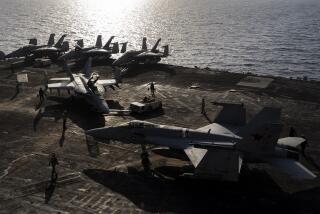On Warships, They Know Going May Get Rougher : Tactics: Elated by their early successes, U.S. sailors and fliers know the war ‘will be a tough one,’ with casualties.
- Share via
ABOARD THE USS WISCONSIN — The signal that the Tomahawk missile was about to be fired from its armored box launcher had been a long, electronic hum.
Then an explosion of light and sound pierced the pre-dawn calm. The missile broke through the seal of its launching tube, appearing at first unsure about what to do next, seeming almost to stop before moving away from the ship in a shallow arc, spreading a halo of light that turned the water pale green beneath it.
Here at sea, the war against Iraq goes on through the days and nights. Fighter jets roar off from the aircraft carriers, heading north towards strategic Iraqi targets. The deadly Tomahawks, shedding their rocket boosters, race for their targets from this World War II-vintage battleship.
“It was pretty to see them go off,” said Anthony Husser, a 19-year-old fireman’s apprentice, after the firing of another missile. “It doesn’t even feel like we have a war. That’s what it really feels like, like we’re shooting for practice.”
But the war is just as real for those on the ships as it is for those in jets and helicopters taking off from land bases in Saudi Arabia and other nearby locations. Only Friday morning, the Navy engaged three Iraqi patrol boats and either sank or disabled them. A pilot from the Saratoga was shot down in the first mission flown off the carrier after hostilities began Thursday.
Long-range Navy artillery will be used when the time comes to mount the ground assault aimed at reclaiming Kuwait.
Many of the pilots returning to their carriers have just experienced their first combat, and they tell what it has been like in the skies against the Iraqis. In the early going, at least, there was little resistance from the Iraqi air force, they said, recalling how enemy jets would suddenly disappear from radar screens, apparently fleeing the Americans in pursuit.
“We prepared for every contingency and every threat in its finest condition, and when we got in there and did our strike we found them to be less than we had anticipated,” said Lt. Cmdr. John Leehouts, from the carrier John F. Kennedy.
Leehouts said he had expected better use of surface-to-air missiles and a more regimented order of attack by Iraqi jets.
“They acted as if they were overwhelmed by the number of aircraft coming toward them,” he said. “And they couldn’t make up their minds which strike group to come after. It was a confused evolution, racing back and forth, and in some cases I don’t think they had a very clear picture exactly who was out there.”
A certain measure of bravado was there as well--the pilots felt flush with the belief that they had taken a good deal of Iraqi President Saddam Hussein’s air power away from him as a curtain raiser for this long-awaited war.
“If I were them, I’d turn around and run, too,” said one of the pilots from the Kennedy.
The pilots also described what it had been like flying at night, tracer bullets all around them, on that first sortie.
“It looks like, if you can imagine, a fireworks display over Disney World, and multiply it 100 times,” said Leehouts. “Just a continual sparkling effect of white flashes that range in height, well below us, from the surface upwards of 3,000 and 4,000 feet, and it’s continuous . . . well over 15 minutes of continuous barrage fire.”
One pilot, Lt. John Klas, said the lack of expected danger did not ease the jitters on that first day out.
“The butterflies in my stomach never really went away. It felt like there were a dozen of them in there,” he said. He also said that as he was flying back to Saudi Arabia after his mission, be began listening to the radio, making a note of all the pilots checking in for a landing approach on the carrier.
“I was hoping everybody made it,” he said. “It was a real feeling of relief.”
Back on the Wisconsin, Capt. David S. Bill had a more somber thought as his ship fired off more Tomahawks.
“This is only the opening round of the war,” he said. “The war will be a tough one as all wars are. People will lose their lives. War is not fun.”
This story was compiled in part from Pentagon combat pool reports reviewed by U.S. military censors.
More to Read
Sign up for Essential California
The most important California stories and recommendations in your inbox every morning.
You may occasionally receive promotional content from the Los Angeles Times.













